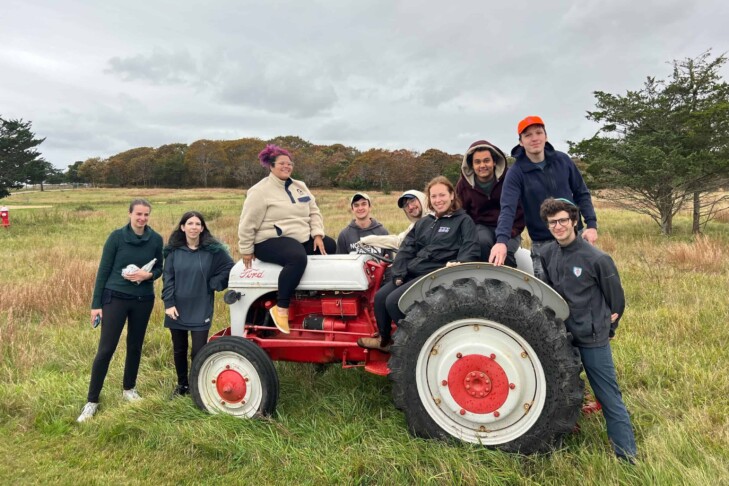For Jewish young adults looking to find community—especially during dark times—Moishe House is a haven. Think of it as the dorm of your Jewish dreams: The nationwide network offers living opportunities and programmatic support for up to four people who host gatherings and conversations for the broader Jewish community. Residents receive rent subsidies and food budgets, and there are locations throughout the Boston area.
Not ready to take that leap? Moishe House also offers “Base” programming, newly launched in Cambridge. Here, rabbinic couples welcome young adults into their homes for socializing, learning, volunteer service and more. They’re mentors, friends and support systems. Locally, Rabbi Jackson Mercer and his partner, Rachel Jackson, host a wealth of public activities from Hanukkah parties to Shabbat meals to leading a night of niggunim (wordless melodies) with area partners such as Hadar’s Rising Song Institute and Temple Beth Zion in Brookline. (Browse future events here.)
Both groups serve as a refuge and a gathering space at a time when people crave kinship on their own terms. I talked to Mercer and Moishe senior community manager Adena Walker about their importance and expansiveness.
These communities must serve such a crucial need. Tell us about them.
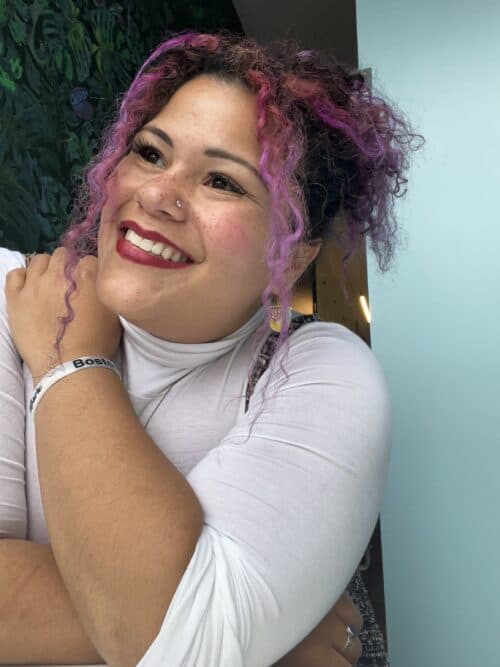
Adena Walker: Moishe House is helping to build Jewish communities for people in their 20s and 30s. In Boston, we have houses and pods. Houses are what I like to consider the Jewish “Real World,” with three to four people. Pods are two people: friends, partners, family members. You can live in a house or a pod for up to three years.
How can people apply? Can the public just join in and get involved?
Walker: All of the above! We call residents our community-builders, who live at the houses. Usually, we don’t have all three or four people moving at the same time. People can apply for openings. If you live at the house, you get part of your rent subsidized, and you get reimbursed depending on the number of programs you do.
We try to find people who are very dynamic, because realistically, you’re putting on five to seven programs a month in a house, or three programs a month in a pod. You should really love and want to create Jewish programming. We have a lot of engagement! On average, we have 100 people attending programs for every house. We usually get about 25 first-time participants per event. Anyone in their 20s and 30s can attend.
And what about the power of Base at a time like this?
Rabbi Jackson Mercer: Base is a national organization focused around a young rabbinic couple. Here, it’s my wife, Rachel, and me. It’s really taking this model of using a home-focused Jewish space as a mechanism for building hospitality-focused opportunities specifically for young adults.
Walker: Sometimes, people need a place to just breathe and commiserate. Sometimes, people need a place of levity to have fun with their friends. Every time that a congregation, shul or a synagogue has a Shabbat or a holiday, they’re not constantly convening. Here, you can go to more things, and we can build community.
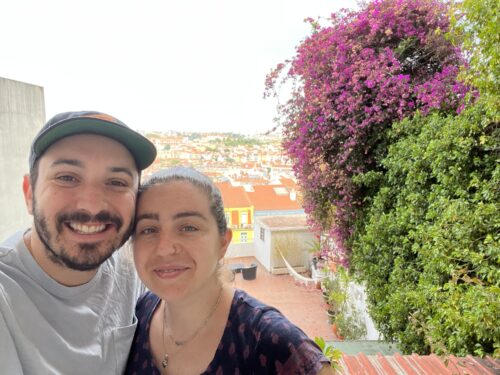
Let’s talk about what’s going on in the world now and how you’ve responded.
Mercer: It’s quite a time to be a rabbi. Almost all of my work through this time has been pastoral presence: having one-on-ones with people, either in-person or virtually, and providing any type of pastoral care they’re looking for. Before any of this was happening, it could be about a parent passing away or a family member being sick or breaking up with a longtime partner.
Now, it’s finding ways to meet individuals where they are, checking in with them and providing an opportunity for them to feel heard and seen. That’s probably 60% to 70% of what we’ve been doing on the ground recently. And the other 30% is continuing to provide the same rhythm to the Jewish year. And that feels really important: to also remind people that while it feels like being an American Jew is about being consumed by this overarching fear, it’s also about all these other things and not losing sight of being able to provide Shabbat meals, learning programs and opportunities to work with some of our community partners.
Walker: And Jackson was actually a pod resident himself!
Mercer: I ran something called the Cambridge Arts Pod. We’re really lucky; I got to roll over some of those programs as well. Music, for me, is how I’m able to hold space and how I’m able to process emotion. I’ve been able to find intimate opportunities with people singing together, working through these emotions in a way that’s not necessarily dialogue, which I think is really helpful.
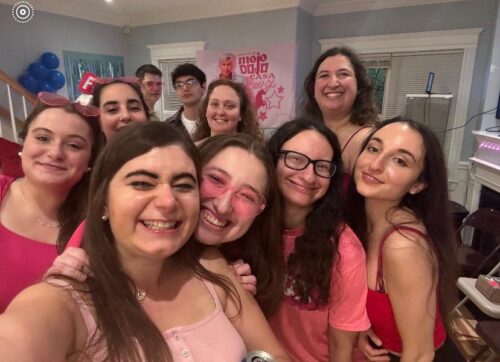
What is the role of community right now, at this moment in history? Why is it important?
Walker: I am a Black Jew of color. And I think a piece of that is having representation. By having all these different houses and pods, it’s reflective of seeing yourself. All of those different aspects of what community can bring in from the houses and what they’re looking to cultivate and create—whether that’s knowing a lot of the people for one program, or maybe that’s not knowing anyone and just coming into a space and feeling comfortable. Sometimes, as someone in their 30s, you may go to a congregation where you don’t know anyone, but if a Moishe House is going somewhere, they can say, “I know that some people are going to be there.” And so you have someone to be there with and in community with, and I think that’s really important.
At one of my Brookline houses, three residents did Moishe House’s 4HQ program, learning in depth about Israel and its many different facets. After Oct. 7, they 100% pivoted. They felt super connected: “How can we help people? What do people need? Let’s just all take a moment.” And that was just really amazing to see.
And in Martha’s Vineyard, with help, we put together a retreat for our Massachusetts residents to take some time back, to recollect, to connect to different pieces of Judaism. We did Torah on the beach, we talked about what it means to be a resident and how you can welcome people into your community. And I had someone who was neurodivergent, who lives on the island, talk about how they’d like to be welcomed into the community. Martha’s Vineyard holds a really special place to me because we used to have a house there. And so I just wanted them to be able to experience that.
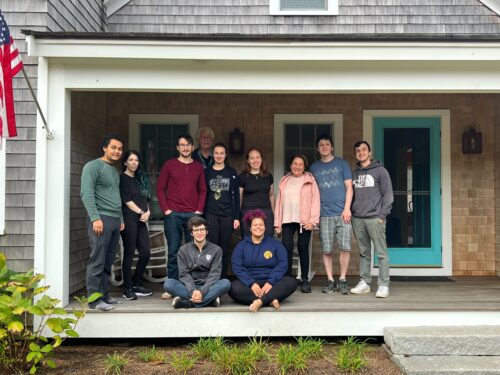
Jackson, how do you see the role of Base Boston right now?
Mercer: I think a lot of what we’ve been focused on is trying to just show up for the people who are right in front of us. I think we have this really great opportunity because we’re so open in terms of being a pluralistic community that reaches in lots of different directions. The first week after Oct. 7, we focused on checking in with the people who we know have family in Israel or are Israelis, how we could support them and their families and definitely support their young kids. Trying to take care of people is at the core of what we’re looking to do. Sometimes, it’s making sure people have a place to go to Thanksgiving dinner. And sometimes, it’s harder; sometimes, it takes a lot more listening in terms of people wanting to feel intellectually stimulated at this time, where there’s so much emotion.
We ask ourselves: What do we have as skills and as professional resources that we can offer to try to meet people where they are and get them to where they want to go? And, if we’re not the right people to do that, who do we know and trust to either partner with or pass these people along to, to make sure they get exactly what they’re looking for?
What are you hearing from people? What are people looking for?
Mercer: It’s so fascinating to meet with people on a pretty regular basis and hear the ways in which people are wrestling with their identity in a way they’ve never wrestled before. Some people want to study Torah. For some people, it’s just: “I don’t really have Shabbat practice, and I’m looking to jumpstart that.”
So, I think there’s an eagerness to find things within Jewish community; it can be an anchor to some extent. I think there’s also a welling up of curiosity, whether that’s a curiosity of being in community with other people or the different parts of tradition. It’s such a fascinating reaction that I don’t think I was expecting. … Most of what we have been doing is sitting with our people in tears, in anger, in confusion, in solitude.
This interview was edited and condensed.


